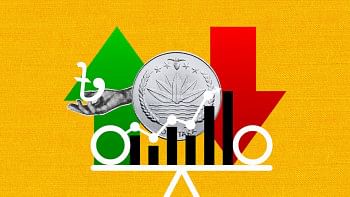Analysts find flaws in plan of installing rooftop solar panels
The government's plan to reduce electricity consumption by forcing building owners to install rooftop solar panels might not yield desired results as the initiative involves a number of flaws, an analyst warned yesterday.
M Rezwan Khan, vice chancellor of United International University, said recent rules make it mandatory for owners of new buildings to set up rooftop photovoltaic (PV) power stations for getting electricity connections from the national grid.
"Apparently, it was not a well-thought plan. Instead of connecting the panels with the national grid, batteries were included in the system that are costly, difficult to maintain and unnecessary."
"The purpose of such a rule was never clear -- as mitigation of power shortage was not possible by this policy and promotion of renewable energy could have been more effective if the money was spent in a more pragmatic way such as setting up rural microgrids for irrigation."
He also said there is severe allegation of corruption as there is no monitoring, and once the electricity connection is obtained the panels are sold to a neighbouring building owner.
"No consideration was given whether the position of the building is right to get unhindered sunshine," he said.
Khan spoke at a session on "promoting renewable energy -- sustainable cooperation" on the concluding day of a two-day regional seminar on infrastructure at Sonargaon Hotel in Dhaka.
Bangladesh Energy Regulatory Commission organised the seminar styled "energy security and regional cooperation: role of regulators" in association with the World Bank and the South Asia Forum for Infrastructure Regulation.
New buildings must install solar panels that could produce 3 percent of the total electricity need of a building before getting any new power connection under the government plan to generate 5 percent of the power from renewable energy sources by 2014.
Khan also said the solar PV-based irrigation is no doubt a positive step, but a dedicated PV-based irrigation system has some weaknesses.
"Most of Bangladesh needs irrigation for three to four months during the dry season only. So, the energy produced by PV is wasted in non-irrigation months making the energy price too high."
"An irrigation system integrated with a microgrid for rural electrification could have been a much more economic and appropriate solution," he said.
The professor also said economic challenge seems to be the main stumbling block in popularising renewable energy. However, economy and technological development are interdependent.
"Hence, before implementation of any project a detailed economic analysis including the energy cost should be done."
MS Islam, an official of Grameen Shakti, said promoting renewable energy is not so easy. However, it has good prospect in Bangladesh to extend its reach as half of the households of the country is outside the national power grid.
He said, although the price of the solar panels has come down recently, the prices of other components such as batteries are still high mainly due to high import duties.
Bangladesh also has good prospect for biogas plants, he said. Ruzaida Daud, head of energy resources department unit, Energy Commission of Malaysia, also spoke.
In the fourth technical session on "energy efficiency and energy cooperation -- regulatory functions", J Michael Biddison, chief of party of USAID-funded Bangladesh Energy Regulatory Assistance Programme, said regulatory leadership is of dire importance in shaping the cooperative and coordinated efforts of all stakeholder interests.
If properly structured and conducted it can better attract private investment, support and promote opportunities for economic growth, keep costs and prices reasonable and defer or eliminate the need for additional high cost capacity, he said.
Biddison said regulatory agencies have quite a bit of authority and power in the further progression of energy efficiency and energy conservation with a variety of tools.
Prasad Ranjan Ray, chairperson of West Bengal Electricity Regulatory Commission, India, who presided over the session, said energy security and energy efficiency go hand in hand.
He said the way energy is transmitted and distributed in the developing countries is like pouring water in a leaked bucket. "They are very inefficient, and there is way to improve them."
Rajarshee Banarjee, managing director of ABB Ltd, Bangladesh, said about 70 percent electricity is consumed through motors. "So, we can save about 50 percent of electricity if we can make these motors efficient."
"If we can have intelligent building management then we will be able to reduce electricity consumption," he said.
Banarjee also said the bottom line must be ensured otherwise nobody would be interested to invest in renewable energy.
Pham Thanh Tung, director of the International Cooperation Department of the General Directorate of Energy in Vietnam, and VP Raja, chairperson of Maharashtra Electricity Regulatory Commission, India, also spoke.

 For all latest news, follow The Daily Star's Google News channel.
For all latest news, follow The Daily Star's Google News channel. 



Comments